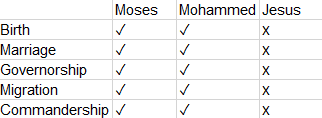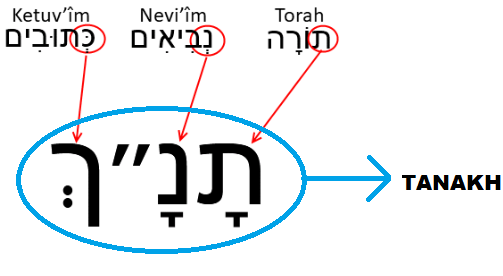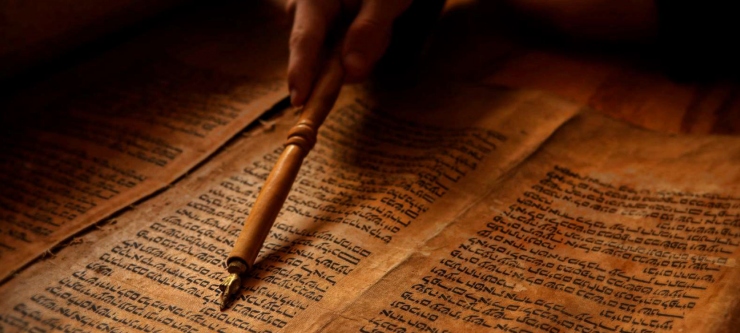INTRODUCTION
The history of religions is an immense field of study. Finding and delivering the right information across numerous topics and resources can be very troublesome for a Muslim researcher. At this point, taking shelter in the Quran’s “guiding” attribute is the safest harbor for those who trust in God. If Muslims who work on the history of religions succeed in carrying out systematic studies under the guidance of the Quran, they can eliminate their need for the studies made in the west.
The issue of the “glad tidings of Prophet Muhammad (PBUH)” in previous books has been tiring the minds of Muslims for a long while. This subject has been studied under the title “Tabsheerat (glad tidings)” in the Islamic tradition.
However, negative attitudes towards previous divine books in the Islamic tradition posed serious obstacles to the progress of these studies. Acting on the premise that the previous books were corrupted, the Islamic tradition has failed to identify and reveal the information about the good news/glad tidings of Prophet Muhammad (PBUH) in these books. It is also a problem in terms of scientific/scholarly ethics to make a book that is allegedly corrupted as a reference to divine glad tidings. These contradictory attitudes and studies may mean something to please Muslims’ hearts, but we cannot expect the “People of the Book” to take these studies seriously.
GLAD TIDINGS OF THE LAST PROPHET
The Quran draws a very clear and understandable way of both the previous books and the glad tidings about Prophet Muhammad (PBUH). Many problems are solved thanks to this roadmap centered on naskh (abrogation) and tasdeeq (approval/confirmation). The most important of these is the problem of “good news of Prophet Mohammed in the previous books”. For example, what the attribute “Ahmad” of Prophet Muhammad (PBUH) in the 6th verse of Surah Saff in the Quran corresponds to in the Gospels. However, Muslim researchers have not been able to go beyond the Paraclete theory on this subject. The Paraclete theory has many contradictions and can be evaluated as problematic. When we take into account the guidance of the Quran, we can see that the issue can be solved flawlessly and clearly.
In this piece of work, we will visit the Torah about the glad tidings of Prophet Muhammad (PBUH). It is useful to remind that The Quran mentions two sources regarding the glad tidings of Prophet Muhammad (PBUH); Torah and Gospel:
“They (those who trust God’s verses) are the ones who follow this scripturally illiterate[1] Prophet Messenger whose description they find in the Torah and the Gospel with them. That Messenger commands them to do good acts and forbids them from improper conduct. He legitimizes the things which are clean and makes unlawful the things that are unclean. He casts off their burden (the responsibility of trusting and supporting the next Messenger) and the shackles upon them. Those who believe in him, support him, help him and follow the light (Book) sent down with him, are the ones who will achieve what they hope” (The Quran 7:157).
If the notions of “Torah and Gospel” were mentioned in verse in a general sense, it would cause serious discussions: Which Torah? Which Gospel? However, all disputes were avoided by the expression “with them“. If any Christian or Jew came across this verse today, and if there was no equivalent of this verse in the book that they have, they would probably discredit and ignore the Quran. In such a case, no power could tell them that the Quran is the book of God. However, the Quran is very confident that the book with them, which they call Torah or Gospel, contains this information. Neither at the era when the Quran was revealed nor today, nobody has been able to put forward the opposite of the Quran’s claim. The objections coming from the People of the Book are mostly aimed at refuting the arguments that Muslims put forward as evidence. Those arguments are indeed problematic, as it is in the Paraclete issue. The problem here stems from Muslims, not the Quran.
Regarding the glad tidings of Prophet Muhammad (PBUH), we will examine the Torah. The address of Muslim researchers concerned with this topic is mostly obvious: Deuteronomy 18:18. Indeed, this passage heralds Prophet Muhammad (PBUH). However, the details regarding these glad tidings are overlooked because we cannot develop a comparative reading with the Quran. This fails us to bring our work to the desired efficiency.
We will focus on only one piece of information in the passage. We will try to find out the equivalent of this information in the Quran and the emphasized attribute of Prophet Muhammad (PBUH).
VIEWS ON “A PROPHET LIKE MOSES”
In the Torah, which we currently have in our hands, it is stated that God informed Moses (PBUH) that He will assign “a prophet like him from among their brothers”:
“I will raise up for them a prophet like you from among their brothers, and will put My words in His mouth, and He shall speak to them all that I command Him. And it shall be that whoever will not listen to My words, which He speaks in My name, I will call him to account.” (Deuteronomy 18:18-19)
Rashi does not comment on these passages in his Torah commentary. Today’s Jewish interpretations of these passages mostly tell that they are not related to a specific prophet to come as no prophet can be like Moses, and the expression “like you” here indicates that all prophets who will come after Moses will follow Moses’ way. Therefore, the Jews claim that these passages in the Torah are not related to a prophet who will come after Moses, but it is about all the Jewish prophets after Moses.
Christians, on the other hand, claim that Jesus (PBUH) is the prophet who is like Moses and he is the person mentioned in the passages. As proof, they cite the following passages from the book of Acts written by Paul’s personal doctor, Luke:
“(Petrus said) Heaven must receive him (Jesus Christ) until the times of restoration of all things, which God has spoken by the mouth of all His holy prophets since the world began. For Moses truly said, ‘The Lord your God will raise up for you a Prophet like me from your brethren. Him you shall listen to in all things, whatever He says to you. And it shall be that every soul who will not listen to that Prophet shall be utterly destroyed from among the people of God.’” (Acts 3:21-23)
Muslims also argue that the statements in the relevant passages are about Muhammad (PBUH). The similarities that Muslim scholars established between Moses and Muhammad are mostly on figural and external issues:

Similarities shown by Muslims are as shown above in the figure. It is worth noting that there is an attempt to establish similarities between Moses and Muhammad’s private lives, which are not directly related to prophethood. Based on the same criteria, Muslims try to prove that Moses does not resemble Jesus, and therefore the prophet Jesus is not mentioned in the book of Deuteronomy.
EXPECTATIONS ABOUT A PROPHET LIKE MOSES
The expectation that the future prophet would be like Moses should also have existed when the Quran was revealed, as the Meccan disbelievers claim that Muhammad should show miracles just like Moses if he is telling the truth. In their opinion, since the future prophet is a prophet like Moses, he should be able to show the same miracles that Moses showed:
“Now that the truth has come to them from Us, they say, ‘Why has he not been granted (miracles) the like of what Moses was granted?’ Didn’t they (people thinking like them) before this deny what had been granted to Moses (as of miracles)? They say, ‘Two magicians who back each other up.’ And they add, ‘We reject either of them!’” (The Quran 28:48).
In these verses sent down in Mecca, it is seen that disbelievers did not demand any other miracle but miracles similar to Moses’ (PBUH). They thought, if Muhammad is indeed the expected person, he should be granted both a Book and miracles similar to Moses’. Indeed, many miracles were given to Jesus (PBUH) too, and it was not that far in terms of historical timeline. However, the Meccan polytheists were dwelling on the name “Moses”. This proves that the knowledge about the future prophet’s attributes who will be “a prophet like Moses” was extremely widespread in society at that time. Hence, the disbelievers put forward a rejection against Prophet Muhammad (PBUH), devoting the similarity only to miracles. The Quran gave the necessary answer at the end of the same verse:
Didn’t they (people thinking like them) before this deny what had been granted to Moses (as of miracles)? They say, ‘Two magicians who back each other up.’ And they add, ‘We reject either of them!’
SIMILARITY ASPECTS DECLARED BY GOD
After God denied these claims about the miracle request, He pointed out the similarity between the books and showed where to look if they are searching for similarity:
Say: “Bring, then, (another) revelation from God which would offer better guidance than either of these two (and) I shall follow it if you speak the truth!” (The Quran 28:49).
It is significant that the verse refers to only two books. Just by looking at this verse, we cannot clearly understand what is meant by “the two books” in question. When we evaluate in the light of other related verses, it becomes clear that these two books are the Quran and the Book of Moses (Sefer Moshe). Moreover, it is the first rational possibility that before this verse, in verse 48, there is a discussion about “similar to what was given to Moses“. So, verse 49, in response to 48, mentions the book given to Moses.
THE BOOK OF MOSES / SEFER MOSHE
To the opposite of traditional Islamic claims, no verse in the Qur’an mentions that the Torah was granted to Moses. Even the words Moses and Torah are not included in verses close to each other because the Torah is not a book granted to a single prophet. Each of the books sent down to Israelite prophets is a part of the Torah. It is also used in this sense in Jewish literature.
In the Quran, when the book given to Moses is mentioned, the phrase “Kitabu Musa” (Book of Moses) is used in the verses. It is also stated that the book given to Moses was in the possession of the Jews, that they wrote it on the parchments, and they opened some of those scrolls to people and kept some of them:
“They did not duly appraise God with His true appraisal when they said, “God has not sent down anything to any human being.” Say, “Who sent down the Book that Moses brought as a light and guidance for humankind, which you make into parchments that you display while concealing much (of it)? You and your forefathers were taught that which you knew not (before it).” Say, “God (sent it down),” then leave them to play at their vain discourse” (The Quran 6:91).
A narration in Ibn Sa’d’s Tabaqat may be an example of the hiding of the parchments mentioned in the verse:
“Ka’b’ul Ahbar says: My father wrote a book from the Torah and told me to act with it. He sealed other books and had promised me not to open their seals. As I observed the emergence of Islam, my soul told me ‘Maybe your father has hidden some information from you’. “I opened the seals and read the other books of the Torah. So I saw the qualities of Muhammad and his ummah there personally and now I have become a Muslim”.
The concept of Torah in the Quran corresponds to the expression “Torah Shebikhtav / Written Torah / Tanakh” in Jewish literature, whereas the Christian literature calls it “The Old Testament”. Written Torah consists of three parts: Torah (Law)[2], Nevi’im (Prophets), Ketuv’im (Writings). Sefer Moshe (Book of Moses) corresponds to the “Law” section, which is the first section of the Written Torah. Based on the initial letters of these three parts, the word “TANAKH” was created.

Sefer Moshe (Book of Moses) consists of five books, and therefore it is also called Pentateuch:
- Bereshit (בְּרֵאשִׁית, literally “In the beginning”) – Genesis
- Shemot (שְׁמֹות, literally “The names [of]”) – Exodus
- Vayiqra (וַיִּקְרָא, literally “And He called”) – Leviticus
- Bemidbar (בְּמִדְבַּר, literally “In the desert [of]”) – Numbers
- Devarim (דְּבָרִים, literally “Things” or “Words”) – Deuteronomy
Sefer Moshe is the most important book for Jews, because the laws of God are included in this book with all their details. It was kept in the sacred chest (tabut). This chest disappeared during the exile of Babylon. The Sefer Moshe we have today was unearthed by Ezra’s efforts in the 4th century BC.
The books that were sent to other prophets were not placed in this chest. According to the Jews, Sefer Moshe is the main book, the scriptures granted to other prophets are the books that were sent down to better understand and explain Sefer Moshe. All prophets also ruled and judged by the law in Sefer Moshe. Because the source of the law in Judaism is Sefer Moshe:
““If you do not carefully observe all the words of this law that are written in this book, that you may fear this glorious and awesome name, The Lord, Your God, then the Lord will bring upon you and your descendants extraordinary plagues—great and prolonged plagues—and serious and prolonged sicknesses.” (Deuteronomy 28:58-59).
“Observe what the Lord your God requires: Walk in obedience to him, and keep his decrees and commands, his laws and regulations, as written in the Law of Moses. Do this so that you may prosper in all you do and wherever you go.” (I Kings 2:3).
Malachi is the last prophet in the Torah. Also in the revelation to him, God commands to obey the law of Moses:
“Remember to obey the Law of Moses, my servant—all the decrees and regulations that I gave him on Mount Sinai (Mount Horev) for all Israel” (Malachi 4:4).
There are four different types of texts in terms of content in the Book of Moses:
1) Historical: Stories and historical information of previous prophets and Israelites.
2) Prophetic: Texts about the events awaiting the Israelites.
3) Wisdom: Chapters containing advice.
4) Law: Ten orders, hudud penalties, inheritance, marriage, divorce, war law, etc. provisions in all matters.
Sefer Moshe is a document of superiority among the Israelites that distinguishes Moses from all other prophets. It is said that no prophet like him has ever appeared among the Israelites.
THE BOOK GRANTED TO JESUS (PBUH): Injeel in Quran terms
The book granted to Jesus (PBUH) is called “Injeel” in the Quran. Obviously, it is from the same root as the word “evangel”. Yet, it is not used to refer to canonical Gospels only. It may additionally refer to any provision granted to Jesus, some of which might have been announced as apocryphal after his death. The Gospel that was revealed to Jesus (PBUH) abolished some of the provisions in the Sefer Moshe. However, these provisions deal with a small number of issues, such as food and Sabbath day. Apart from this, Jesus (PBUH) ruled the people with the commandments in Sefer Moshe. That is why the Quran informs that Jesus (PBUH) was taught both the Torah and the Gospel:
“God will teach Him the Book and the Wisdom, the Torah and the Gospel” (The Quran 3:48).
When we look at the Gospels, we see that Jesus (PBUH) invited the people to the law of Sefer Moshe:
“On one occasion, an expert in the law stood up to test Jesus. “Teacher,” he asked, “what must I do to inherit eternal life?” “What is written in the Law?” he replied. “How do you read it?” He answered, “‘Love the Lord your God with all your heart and with all your soul and with all your strength and with all your mind’; and, ‘Love your neighbor as yourself.’” (Luke 10:25-28)
As it is understood, Jesus (PBUH) was also a prophet who was bound by the law of Moses. The Gospel, which was sent down to him, made some minor changes – which were mostly alleviations- to the law of Moses; but for the most part, Moses’ law was in force.
THE BOOK GRANTED TO MUHAMMAD (PBUH) AFTER MOSES (PBUH): The Quran
The only prophet who was given a book that replaces the law in The Book of Moses is Muhammad (PBUH). Muslims are not responsible to look at the commandments in The Book of Moses, they act only in accordance with the Quran.
The Quran contains provisions on every subject (worships, hudud penalties, inheritance, marriage/divorce, etc.), just like the Book of Moses. With this attribute, Muhammad (PBUH) is the only prophet after Moses who was given a complete book of law.
It is important in this respect that there are verses drawing attention to the similarity between the Quran and the Book of Moses:
“We had granted Moses that Book to complete our favor upon those who commit beautiful deeds, explaining everything in detail, and (thus) as guidance and grace. So that they may believe in the meeting with their Master (in the hereafter)” (The Quran 6:154).
“In their (Joseph and his brothers’) stories there is certainly a lesson for people of integrity[3]. This (The Quran) is not a fabricated narrative but a confirmation of what is before It and the detailed explanation of all things. It is a guide and grace to a people who believe” (The Quran 12:111).
In some verses, it is stated that there was the Book of Moses before the Quran. It draws attention to this similarity:
“Is (someone who is only keen on worldly life compared with) one who takes his stand on clear evidence (Book) from his Master? A witness from his Master recites that evidence. Before that (evidence) is the Book of Moses as a precursor and grace. They (who see this relationship between them) believe in it (the Quran). For any of the factions who deny its truth – the fire shall be their appointed state (in the hereafter). And so, be not in doubt about this (revelation). It is the truth from your Master, even though most people do not believe in it” (The Quran 11:17).
“And before it (the Quran), there is the Book of Moses, a precursor, and grace. And this is a confirming Book, in the Arabic language, to warn those who do wrong and to be glad tidings for those who commit beautiful deeds” (The Quran 46:12).
It is not possible to understand the meaning of the expression “there is the Book of Moses before the Quran” without establishing a relation of confirmation between divine scriptures. When you read these verses, the perception you’ll get is that the first divine Book that was sent down after the Book of Moses was the Quran. However, as we all know and the Quran itself mentions, many prophets who were given books have come and gone between Moses (PBUH) and Muhammad (PBUH). If you use basic logic, the most widely known divine Scripture before the Quran would be the Scripture granted to Jesus, not Moses. What is the meaning of this sentence then?
We know that neither Jesus nor the prophets before him had come to abolish the law commanded to Moses:
“Think not that I have come to abolish the law and the prophets; I have come not to abolish them but to fulfill them. For truly, I say to you, till heaven and earth pass away, not a dot, will pass from the law until all is accomplished.” (Matthew 5:17-18)
The fundamentals of the law were always in the Book of Moses. The scriptures following it, including Jesus’, were built upon it like the bricks of a building.
Considering all of these, we can understand the following: The expression “there is the Book of Moses before the Quran” (The Quran 46:12) states that the law that was valid before the Quran was the law in the book of Moses. Thus, the only prophet that came after Moses and received detailed provisions on every subject -as had happened to Moses- was Muhammad (PBUH). The Quran is the final divine Book which includes the whole divine law. Therefore, it is the Book similar to Moses’ and Muhammad is the Prophet similar to Moses.
The fact that some groups of Jinn (invisible beings) who listened to the Quran had said “We have listened to a book revealed after Moses” when they returned to their communities, shows that Muhammad was the expected prophet who was like unto Moses:
“O our community! We have listened to a Book revealed after Moses. It confirms the books which came before it. It guides to the truth and to the right path” (The Quran 46:30).
CONCLUSION
A future prophet is mentioned in the Torah that is with both Jews and Christians. One of the attributes of this prophet is that “he is like Moses”. Jews, Christians, and Muslims have put forward various arguments on this issue. While Jews argued that no prophet could be like Moses (PBUH), Christians claimed that the relevant phrase refers to Jesus (PBUH), and Muslims referenced it to Muhammad (PBUH). Muslims mostly base their thesis on personal similarities (marriage, birth, leadership, migration, etc.) between Moses and Muhammad (PBUT). The Quran, however, points out that we should concentrate on the similarity between the Books, which is directly related to prophethood.
God sent down to Moses (PBUH) a Book that completely abrogated the scriptures before him and contains detailed provisions on every subject. No prophet after Moses (PBUH) had been sent down such a book until Muhammad (PBUH), the final prophet. The Quran contains detailed provisions and commandments (Law) on every subject, just like the Book of Moses. It Quran also mentions the lives of previous prophets, informs people of some future events, and contains wise advice that guides people in all areas of life, like the Book of Moses.
In Surah Muzzammil, which is chronologically one of the first chapters of the Quran, the similarity of Prophet Muhammad (PBUH) to Prophet Moses (PBUH) must have conveyed the necessary message to the essential places in the first days of prophethood:
“We have sent to you a Messenger, to be a witness over you, just as We sent a Messenger to Pharaoh” (The Quran 73:15).
[1] The expression “scripturally illiterate” is the translation of the word “ummi” and refers to a person who has not read or learned about any of the divine Scriptures before.
[2] The word “Torah” in the word “TANAKH” is not the proper name of the divine book granted to the Children of Israel. It is a common noun that is used to denote “The Book of Moses” because the word “torah” means “law” in the Hebrew lexicon and the law is in The Book of Moses.
[3] The expression translated as “people of integrity” is “ul’ul albab”.
Research by Vedat YILMAZ
Translation by Can ABDULLAH








Add comment